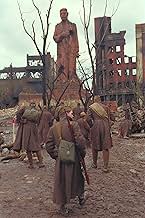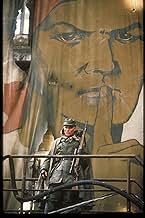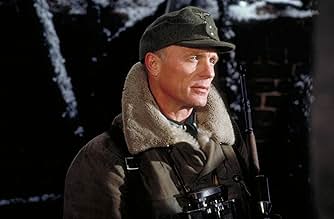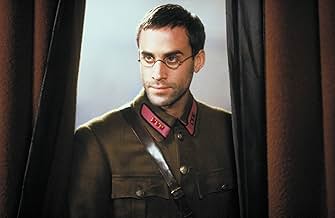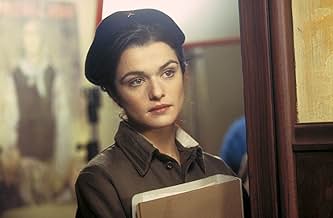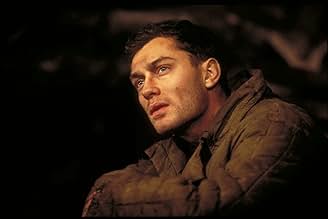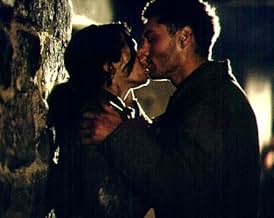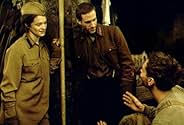A Russian and a German sniper play a game of cat-and-mouse during the Battle of Stalingrad.A Russian and a German sniper play a game of cat-and-mouse during the Battle of Stalingrad.A Russian and a German sniper play a game of cat-and-mouse during the Battle of Stalingrad.
- Director
- Writers
- Stars
- Awards
- 7 nominations total
Gabriel Thomson
- Sacha Filipov
- (as Gabriel Marshall-Thomson)
Hans-Martin Stier
- Red Army General
- (as Hans Martin Stier)
Clemens Schick
- German NCO
- (as Clemans Schick)
- Director
- Writers
- All cast & crew
- Production, box office & more at IMDbPro
Featured reviews
ENEMY AT THE GATES / (2001) *** (out of four)
By Blake French:
"Enemy At The Gates" takes place in 1942 and details a cat and mouse chase between two snipers. The mouse is a young Russian named Vassili Zaitsev (Jude Law), who arrives on the shores of the Volga River to defend Stalingrad, an important city in which the German's are attempting to capture. Zaitsev soon finds himself befriending a political officer named Danilov (Joseph Fiennes), who is impressed by the soldiers quick skills and decides to glorify him through the local press. Zaitsev becomes a political icon for the locals, giving them encouragement and increasing their hope for victory.
The cat is an opposing sniper named Major Koenig (Ed Harris), a famous sharpshooter called upon to kill Zaitsev. Koulikov (Ron Perlman), another talented sniper, is assigned to help Zaitsev in killing Koenig before the Major takes a victory shot. To further complicate matters, Zaitsev falls in love with another soldier, Tania (Rachel Weisz), whose parents were killed by the enemies, and wants to redeem their honor.
"Enemy At The Gates" certainly paints a vivid, graphic depiction of war. The atmosphere is unsettling and bleak, the characters are almost always dirty and sleepless, the fighting scenes consist of brief, short, instantaneous shots, but the sequences are fast-paced, genuine, and disturbing. The city looks battered and tormented. The dialogue goes hand and hand with the character's actions; the plot is challenging and the movie is focused, about something solid. In the sequences where Koenig and Zaitsev challenge one another, the tension is very effective. The movie tends to realize that, and concentrates a great deal of effort in making those scenes suspenseful and taut.
Joseph Fiennes plays a meek, nervous character and does a good job at bringing him to life believably. Jude Law, whose last work in "The Talented Mr. Ripley" provides a tough act to follow, accomplishes great things with a determined and assiduous character. Ed Harris is the standout actor here, in a harrowing, steadfast, juicy performance. Rachel Weisz cannot do a whole lot with her character, however. She often feels strained and contrived.
"Enemy At The Gates" tries hard to express the subject of the media's influence in our culture. If the film, co-written and directed by Jean-Jaques Annaud ("Seven Years in Tibet"), would have stayed on that concept, it would have been a whole lot better. The romance between Zaitsev and Tania is kind of unnecessary, and I am not sure if the sex scene is obligatory or advances their relationship. This love side story lacks passion; a lot of it feels mechanical and routine. "Enemy At The Gates" is still a consistently intriguing war film-rare because it does not involve Americans. While we are never really concerned about the outcome of the actual war, nor do we entirely care about several aspects of the main characters, there are many good scenes of suspense, and the overall mood of the movie is effective. "Enemy at the Gates" is worth seeing if it sounds interesting to you.
By Blake French:
"Enemy At The Gates" takes place in 1942 and details a cat and mouse chase between two snipers. The mouse is a young Russian named Vassili Zaitsev (Jude Law), who arrives on the shores of the Volga River to defend Stalingrad, an important city in which the German's are attempting to capture. Zaitsev soon finds himself befriending a political officer named Danilov (Joseph Fiennes), who is impressed by the soldiers quick skills and decides to glorify him through the local press. Zaitsev becomes a political icon for the locals, giving them encouragement and increasing their hope for victory.
The cat is an opposing sniper named Major Koenig (Ed Harris), a famous sharpshooter called upon to kill Zaitsev. Koulikov (Ron Perlman), another talented sniper, is assigned to help Zaitsev in killing Koenig before the Major takes a victory shot. To further complicate matters, Zaitsev falls in love with another soldier, Tania (Rachel Weisz), whose parents were killed by the enemies, and wants to redeem their honor.
"Enemy At The Gates" certainly paints a vivid, graphic depiction of war. The atmosphere is unsettling and bleak, the characters are almost always dirty and sleepless, the fighting scenes consist of brief, short, instantaneous shots, but the sequences are fast-paced, genuine, and disturbing. The city looks battered and tormented. The dialogue goes hand and hand with the character's actions; the plot is challenging and the movie is focused, about something solid. In the sequences where Koenig and Zaitsev challenge one another, the tension is very effective. The movie tends to realize that, and concentrates a great deal of effort in making those scenes suspenseful and taut.
Joseph Fiennes plays a meek, nervous character and does a good job at bringing him to life believably. Jude Law, whose last work in "The Talented Mr. Ripley" provides a tough act to follow, accomplishes great things with a determined and assiduous character. Ed Harris is the standout actor here, in a harrowing, steadfast, juicy performance. Rachel Weisz cannot do a whole lot with her character, however. She often feels strained and contrived.
"Enemy At The Gates" tries hard to express the subject of the media's influence in our culture. If the film, co-written and directed by Jean-Jaques Annaud ("Seven Years in Tibet"), would have stayed on that concept, it would have been a whole lot better. The romance between Zaitsev and Tania is kind of unnecessary, and I am not sure if the sex scene is obligatory or advances their relationship. This love side story lacks passion; a lot of it feels mechanical and routine. "Enemy At The Gates" is still a consistently intriguing war film-rare because it does not involve Americans. While we are never really concerned about the outcome of the actual war, nor do we entirely care about several aspects of the main characters, there are many good scenes of suspense, and the overall mood of the movie is effective. "Enemy at the Gates" is worth seeing if it sounds interesting to you.
No doubt the title is an indication of what the film would LIKE to be about. The Germans forces were indeed "at the gates" - they are on the verge of capturing Stalingrad, they would lay siege to Leningrad, and at one point even Moscow appeared to be in danger. The situation was desperate. But after we're told all this, the position of the German army turns out to have no more to do with the story than the position of the sun in the zodiac. After a bitter, violent battle over - well, we're never told - nothing of a military nature happens again. Not even offstage. (Until the end, when, after a brief "offensive" of unfathomable significance, an epilogue tells us that the Germans were repelled from after all.) All the action in Stalingrad freezes so that we can watch a protracted duel between a Russian and a German sniper.
Now I'm prepared to believe that snipers played a valuable role in this kind of warfare - I wouldn't know - but Vassili's primary value, we must assume in the absence of information to the contrary, is as propaganda - a means of keeping up the morale of the local troops. But there's something circular here. The snipers are the only people we see doing any actual fighting, and by the end of the film they seem to be devoting all their efforts to shooting a German sniper who is in turn doing nothing but trying to shoot Vassili. What does ANY of this have to do with, you know, the invasion?
The fact that the troops of a hostile foreign power are on Russian soil (they haven't yet been defeated, and it looks to be only a matter of time before even Moscow would be overrun) doesn't seem to motivate the characters to do much. Nobody makes a single decision for the good of the war effort as a whole. Danilov builds up the Vassili legend because of personal feelings and is ready to tear it down later for other personal reasons; Tania wants to kill Germans - kill them herself, by hand, rather than help her fellow soldiers as best she can by working in intelligence - because they killed her parents; Danilov tries to transfer her to a safer job not because that's where she should be (it's a mere coincidence that that IS where she should be), but because he's hitting on to her; Vassili's heart isn't in the duel with the German sniper until he has a casual acquaintance's death to avenge. When Sacha's mother is told that her son is a traitor (now serving the forces who have bombed the city she grew up in to rubble), her only reaction is, "Perhaps he'll be safer with them than with us." Wherever we look, we see dreary personal concerns. Did any of these people notice that the enemy IS at the gates?
If Anaud was trying to make his characters more plausible by making them pettier, he failed. When Sacha tells a third party what we supposedly already know - that Tania is in love with Vassili - it came as news to me. I hadn't seen any insipient love anywhere. I suppose I ought to have worked it out, by assuming that the single female character must be there to fall in love with someone and using a process of elimination to work out who it was (she plainly didn't care for one of the two candidates, therefore she must be head over heels with the other one), but really, even in a movie as dull as this, I have better things to do.
Now I'm prepared to believe that snipers played a valuable role in this kind of warfare - I wouldn't know - but Vassili's primary value, we must assume in the absence of information to the contrary, is as propaganda - a means of keeping up the morale of the local troops. But there's something circular here. The snipers are the only people we see doing any actual fighting, and by the end of the film they seem to be devoting all their efforts to shooting a German sniper who is in turn doing nothing but trying to shoot Vassili. What does ANY of this have to do with, you know, the invasion?
The fact that the troops of a hostile foreign power are on Russian soil (they haven't yet been defeated, and it looks to be only a matter of time before even Moscow would be overrun) doesn't seem to motivate the characters to do much. Nobody makes a single decision for the good of the war effort as a whole. Danilov builds up the Vassili legend because of personal feelings and is ready to tear it down later for other personal reasons; Tania wants to kill Germans - kill them herself, by hand, rather than help her fellow soldiers as best she can by working in intelligence - because they killed her parents; Danilov tries to transfer her to a safer job not because that's where she should be (it's a mere coincidence that that IS where she should be), but because he's hitting on to her; Vassili's heart isn't in the duel with the German sniper until he has a casual acquaintance's death to avenge. When Sacha's mother is told that her son is a traitor (now serving the forces who have bombed the city she grew up in to rubble), her only reaction is, "Perhaps he'll be safer with them than with us." Wherever we look, we see dreary personal concerns. Did any of these people notice that the enemy IS at the gates?
If Anaud was trying to make his characters more plausible by making them pettier, he failed. When Sacha tells a third party what we supposedly already know - that Tania is in love with Vassili - it came as news to me. I hadn't seen any insipient love anywhere. I suppose I ought to have worked it out, by assuming that the single female character must be there to fall in love with someone and using a process of elimination to work out who it was (she plainly didn't care for one of the two candidates, therefore she must be head over heels with the other one), but really, even in a movie as dull as this, I have better things to do.
In the grand tradition of Old Hollywood, this international co-production seeks to frame the key battle of WW2 (the REAL key battle, not the ones from the John Wayne movies) as a morality tale involving a love triangle.
It is a bold idea, and beautifully executed.
In fact an argument could be made -- and I will make it -- that any flaws in the execution (it lags a bit here and there) are the result of the film-makers' "reach exceeding their grasp" and they attempted too much, more than one film could ever accomplish.
But what a film it is! You viewer feel as though you are there, making history. The four stars involved have, each of them, never given a bad performance in their careers and they surely maintain their records here.
Ed Harris in particular -- although he has less screen time -- will always to this reviewer seem a vastly under-rated actor. (This review written in 2017 where an older Harris still uses his charisma in a defining role for HBOs Westworld .... and nails it.) Recommended? Absolutely! In the Metacritic data that IMDb so helpfully provides I could not help but notice one reviewer commenting that, well, it sure isn't in the same class as SAVING PRIVATE RYAN.
Which is the irony of doing film reviews. I have never not once thought of wanting to see SAVING PRIVATE RYAN again, but this film is one I like to revisit every few years. Magnificent.
It is a bold idea, and beautifully executed.
In fact an argument could be made -- and I will make it -- that any flaws in the execution (it lags a bit here and there) are the result of the film-makers' "reach exceeding their grasp" and they attempted too much, more than one film could ever accomplish.
But what a film it is! You viewer feel as though you are there, making history. The four stars involved have, each of them, never given a bad performance in their careers and they surely maintain their records here.
Ed Harris in particular -- although he has less screen time -- will always to this reviewer seem a vastly under-rated actor. (This review written in 2017 where an older Harris still uses his charisma in a defining role for HBOs Westworld .... and nails it.) Recommended? Absolutely! In the Metacritic data that IMDb so helpfully provides I could not help but notice one reviewer commenting that, well, it sure isn't in the same class as SAVING PRIVATE RYAN.
Which is the irony of doing film reviews. I have never not once thought of wanting to see SAVING PRIVATE RYAN again, but this film is one I like to revisit every few years. Magnificent.
I simply want to weigh in with a very positive response to Enemy at the Gates. Taken as a historical drama rather than an attempt to flawlessly depict an historical incident, this is topnotch entertainment. "Enemy" portrays the conflict between a young Russian sniper played by Law and the German sniper (Harris) who is sent to kill him during the German attack on Stalingrad during WWII. Apart from a scene which awkwardly caricatures the Russian field commanders and the occasionally distracting accents, the film successfully immerses the viewer in this tense war drama. Appreciate it it for its tight focus, uncompromising realism, and fine characterizations by the main actors. Research the historical accuracy later, if you must, but don't let it spoil the film.
It's the fall of 1942. Vassili Zaitsev (Jude Law) grew up hunting with his father in the woods. He, Tania (Rachel Weisz) and countless other untrained recruits are brought up to the front at Stalingrad. He and Commisar Danilov (Joseph Fiennes) survive a suicidal charge. Vassili kills 5 Germans in the aftermath and Danilov writes about him. Nikita Khrushchev (Bob Hoskins) seizes the opportunity to make him a star. Opposing him is the aristocratic German sniper Major König (Ed Harris).
The opening is an amazing opera of mass destruction. Then it's a matter of a chess game. It's a fascinating cat and mouse game in the ruins of the city. I'm glad that nobody decided to talk in a fake Russian accent. That would be too distracting. This is a rare good American war movie not about Americans.
The opening is an amazing opera of mass destruction. Then it's a matter of a chess game. It's a fascinating cat and mouse game in the ruins of the city. I'm glad that nobody decided to talk in a fake Russian accent. That would be too distracting. This is a rare good American war movie not about Americans.
Did you know
- GoofsIn the scene where Vassili is lighting the cigarette butt he picked up from the German sniper, it's apparent by the flame he uses a butane lighter. Butane lighters were not invented until the 1950's.
- Quotes
Commisar Danilov: I've been such a fool, Vassili. Man will always be a man. There is no new man. We tried so hard to create a society that was equal, where there'd be nothing to envy your neighbour. But there's always something to envy. A smile, a friendship, something you don't have and want to appropriate. In this world, even a Soviet one, there will always be rich and poor. Rich in gifts, poor in gifts. Rich in love, poor in love.
- Crazy creditsThe end credits are slanted and curved.
- SoundtracksLa Chanson des Artilleurs
Music by Tikhon Khrennikov
Lyrics by Viktor Gusev
(C) Musikvertag Hans Sikorski, Hamburg
Performed by The Red Army Choir (as Les Choers De L'Armee Rouge)
Courtesy of 7 Productions, Paris
- How long is Enemy at the Gates?Powered by Alexa
Details
- Release date
- Countries of origin
- Official sites
- Languages
- Also known as
- Stalingrad - Enemy at the Gates
- Filming locations
- Production companies
- See more company credits at IMDbPro
Box office
- Budget
- $68,000,000 (estimated)
- Gross US & Canada
- $51,401,758
- Opening weekend US & Canada
- $13,810,266
- Mar 18, 2001
- Gross worldwide
- $96,976,270
- Runtime
- 2h 11m(131 min)
- Color
- Sound mix
- Aspect ratio
- 2.35 : 1
Contribute to this page
Suggest an edit or add missing content


